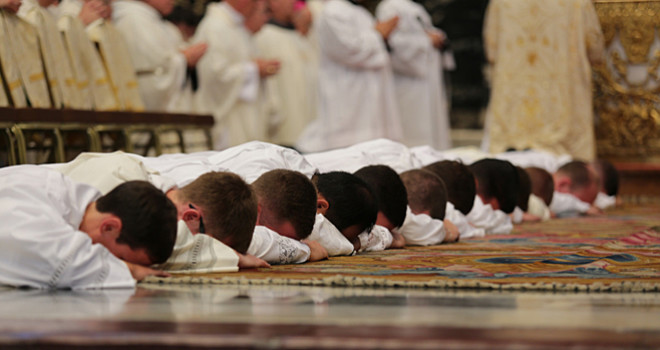
The essay is the primary method of assessing mastery of concepts in high school theology courses. Here, Aidan Moorehouse (class of 2020), provides a supreme example of mastery. The assignment required the creation and exposition of an original thesis statement from the content covered in the book "Theology of the Body for Beginners" by Christopher West.
To say the world misunderstands the meaning of sex would be an almost comical understatement. Say that the world misunderstands the purpose of celibacy, and the misconceptions approach a surreal level. The world views celibacy as an unnatural constraint, a wholly unnecessary sacrifice that can only bring suffering to its unfortunate practitioner. However, celibacy is in fact a God-given calling that, far from suppressing man’s sexuality, actually liberates him to focus entirely on that which his sexuality points to, namely eternal happiness, love, and communion with God. In fact, when celibacy is spurned, the very meaning of that beautiful God-woven tapestry that is the human body, as it is expressed in not only celibate life but also married life, begins to unravel. Furthermore, the objective goodness of a celibate vocation does not mean that marriage is a lesser good, in fact they are both meant to complement and enrich the other. When celibacy is devalued, sexuality as whole is devalued; and when celibacy is understood for what it truly is, so to is married life.
If celibacy and married life are so vitally connected as previously stated, and the culture in which we live seems wholly fixated on one while shunning the other, that does not bode well for said culture. If there is no value in foregoing marriage, then of what value is marriage? If marriage is of no value, then why should what is reserved for marriage remain so? If the marital act is no longer tied to marriage, then does it really matter whom one “does it” with, or in what manner? Therefore, a great many of the maladies that ail our current culture come from a rejection of celibacy and the heavenly destiny that it points towards. With this is in mind, it is not surprising that, “when we lose sight of the joys of heaven, we tend to view sexual union and its physical pleasures as our ultimate fulfillment” (page 54).
The human body has an inherently spousal meaning, that is, it is meant for self-donation and makes no sense without relation to another. For a married person, that calling is fulfilled in their total gift to their spouse, which is meant to be an icon of the love that God has for all of his children. For the celibate, his very life is meant to point to the reality that marriage is a sign of, the superabundance of love that is the Beatific Vision in heaven; as Christopher West explains, “...the celibate man or woman steps beyond the dimensions of history- while living within the dimensions of history- and proclaims to the world that “the Kingdom of God is here”; the ultimate marriage has come” (page 64). In addition, foregoing marriage allows a celibate to dedicate their lives to serving their fellow man in a variety of useful ways; parish priests, nuns, contemplative monks, even the great military orders of the Middle Ages, all of these vocations and more show that giving up marriage “for the sake of the kingdom” certainly does not restrict a person’s humanity in any way whatsoever. The celibate is not called, as a married couple is, to be an icon of God’s love in the world, but to rather bring that love directly into the world through their very person.
A key flaw of the modern world’s view on sex lies in its belief that it is the only option, and that celibacy is utterly useless (Buddhist monks are strangely exempt from this castigation). But if celibacy does serve a vital purpose, then the question of its relationship to marriage naturally arises. Celibacy is a sacrifice; if it is to be worthy of the word, celibacy must entail giving up something of great value. It is wrong to assume that the Church denies the goodness of marriage simply because it values celibacy, for, “The Church values celibacy so highly precisely because she values what it sacrifices- sexual union and all that is connected to it- so highly” (page 70). In celibacy, a married couple finds a visible sign of what their married love should point towards. In marriage, the celibate finds a physical sign of the spiritual fruitfulness that he or she is called to bear. Without celibacy, marriage is a window to a brick wall; without marriage, celibacy is a candle hidden under a bushel.
When the world rejects celibacy, an understanding of the true meaning of marriage ultimately suffers the same fate. A celibate is called to literally live in the world in the same way that married persons are, but his purpose is not to point to man’s ultimate goal, but rather become a living, walking, breathing sign of that heavenly destiny to the world. When the purpose of celibacy is understood, then the redemption of the world’s twisted view of sexuality can truly be accomplished.

